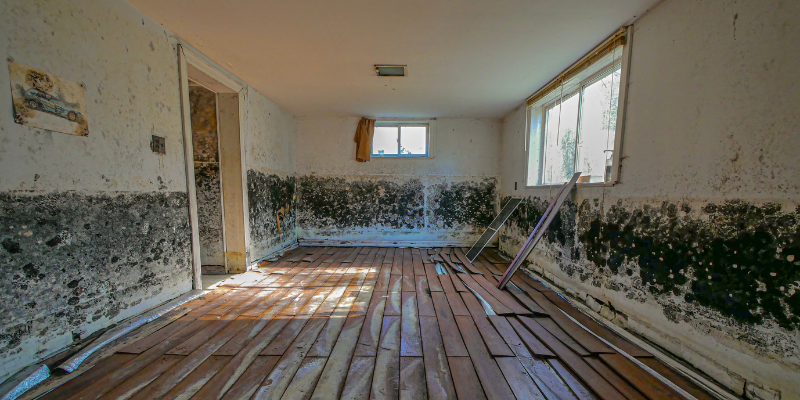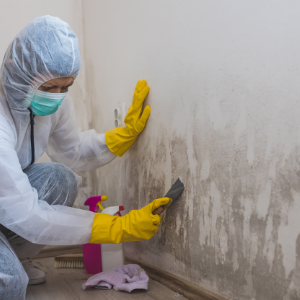
Selling a house with mold in Texas presents unique challenges, requiring strategic preparation and awareness of state-specific regulations. As a homeowner, understanding the impact of mold on property value and its effect on buyer perception is crucial to a successful sale. From accurate disclosure requirements to choosing the right remediation strategy, navigating this process can be complex but manageable. This guide provides essential tips and practical advice for homeowners in Texas who wish to sell their homes despite mold issues, ensuring compliance with legal standards while enhancing property appeal and marketability to prospective buyers.
Key Highlights
- Understand and address the impact of mold on home value and buyer perception for successful sales.
- Mold evaluation involves visual inspection, the use of a moisture meter, and the use of at-home testing kits.
- Professional mold inspections provide detailed assessments, which are crucial for accurate real estate disclosures.
- Target fixer-upper buyers by highlighting the property’s potential post-remediation improvements.
Understanding Mold in Your House
In humid regions like Texas, mold in residential homes has become a common issue and a significant concern for homeowners. As the issue of mold is likely to impact the value and sale of a house, it is essential to understand the various underlying factors. For Texas, mold and mold exposure pose a considerable risk to the community’s health. This essay examines these issues to assist homeowners in developing a definitive resolution to the problem of mold, particularly in strategizing and planning for property sale, thereby easing the transaction for both buy-side and sell-side stakeholders.
Common Causes of Mold Growth
Mold will flourish in areas where water is readily available. Identifying the most common reasons for mold growth will help in controlling the problem before it worsens. Water damage is a significant contributor to the mold problem in homes. Damage of this kind can occur in various ways; a leaky roof, plumbing leaks, and improper bathroom ventilation can all contribute. These areas, especially if the water damage remains untreated, are particularly susceptible to mold growth. Additionally, the climate in Texas is certainly not conducive, with high humidity that has a significant potential for mold growth.
This issue particularly worsens with the onset of the rainy season and flooding, where higher rainfall borders on torrential. During these periods, the mold problems in many homes become desperate. Melting snow and ice add through waterlogged plants, and ramshackle buildings serve as centralizing devices. They tend to collect the water from local and remote areas and transform homes into islands. The brownish and greenerish water, with its touch of the troubling white, becomes the cradle of unreasonable mold aspirations. Plagued by the ceaseless and tuneless lyres of a melodic eternity, some homes descend, descending into mold and oblivion.
Homeowners are fully responsible for these additional strategies. They have to look for diminished water habits, such as using cloths and rags. Integrating these strategies will help reduce the problems caused by mold, thereby protecting the health of the people living in the given home. Addressing the potential sale of the property and preparing it for sale while safeguarding it will require a thorough exploration of the possible causes, and even professional help, for the persistent, unaddressed mold issues.
Health Implications of Mold Exposure

Mold exposure poses serious health risks, making it essential for Texas homeowners to address mold issues before listing their property for sale. Mold spores can spread through the air and enter the respiratory system, potentially triggering a range of allergic and respiratory reactions. For individuals with asthma, allergies, or weakened immune systems, exposure to mold can lead to symptoms such as sneezing, coughing, wheezing, watery eyes, and skin irritation.
Prolonged or repeated exposure to mold can lead to more severe health issues, including chronic sinus infections, fatigue, and, in extreme cases, lung infections. Hidden mold—often found behind walls, under flooring, or within HVAC systems—can quietly worsen indoor air quality without obvious signs, posing additional risks to occupants. Because Texas’s humid climate creates ideal conditions for mold growth, homeowners should take preventive measures to safeguard both their health and property value.
From a real estate perspective, the presence of mold and its associated health concerns can significantly affect a home’s marketability. Buyers are increasingly cautious about air quality and long-term safety, and untreated mold issues can lead to reduced offers or failed inspections. That’s why it’s crucial to schedule a professional mold inspection and remediation before listing your home.
In cases where residents have experienced health issues linked to mold, consulting a medical professional can help determine the extent of exposure and guide necessary treatment. Addressing these problems early not only ensures a healthier living environment but also instills confidence in potential buyers. By taking proactive steps to resolve mold problems and improve indoor air quality, homeowners can create a safer and more desirable property, thereby enhancing both buyer trust and the overall value of their home.
Assessing Mold Damage Before Selling
Before listing your house in Texas, it is crucial to understand the extent of any mold damage. Mold can affect not only the aesthetics but also the value and safety of your home. Addressing mold issues begins with a thorough assessment, which includes evaluating mold levels and considering a professional inspection. Properly assessing the damage helps in determining the most effective remediation strategies, ensuring the property is safe, attractive to buyers, and ready for the market. The insights gained during the assessment phase will guide sellers in making informed decisions on remediation and disclosure obligations.
How to Evaluate Mold Levels in Your Texas Home
In the case of Texas, where hot, humid, and frequently changing temperatures create an ideal environment for mold growth, a highly organized procedure exists to assess and report mold levels as a primary step. Not only does mold affect the property’s value, but mold detection also helps evaluate the scope of the issue and gauge the following steps, including professional remediation and whether to sell the home as is.
First, always start the mold assessment procedure with a visual inspection. Try to assess moisture damage in the bathrooms, attics, basements, and even around windows. Also, check for structural changes, mold and algae, evidence of plumbing backups, and failures in ventilation. Concentrate also on the structure’s thermal insulation to find the possibly still wet internal zones. Always check for any earthy or damp odors, which in many cases indicate the presence of mold, even if it is not visible.
Humidity measurement is a necessary step in any assessment. Unlocking hidden zones, such as the HVAC system and areas behind walls and under carpets, is a sign of potential mold growth. Homeowners can also check for humidity with relative ease with some home spore measurement tools. Such tools are effective in providing a reliable assessment of the need for professional help to deal with hot spots of mold.
Nonetheless, self-tests are limited in scope. For greater accuracy and dependability, hiring a professional who specializes in advanced mold testing is ideal. They provide a detailed evaluation document that explains the level of mold infestation, its possible sources, and its remediation and elimination procedures. This document, in particular, is essential when dealing with buyers in Texas and the state’s legal obligations around mold disclosures.
Being the owner of a home and being in the selling phase with high concentrations of mold can severely limit the choices available to them. Being proactive and remedying the mold in the home can make the selling process smoother and emphasize that the home is mold-free. This reassures buyers that the house is safe to inhabit, enabling them to purchase with confidence. This is the primary reason why mold remediation is essential in the state of Texas.
Conducting a Professional Mold Inspection in Texas
Although a deeper inspection shows more issues than what a DIY test would, the full extent of mold in a house requires a professional mold inspection. The Texas climate is conducive to mold growth and proliferation. Often, they are hidden behind walls, under floors, or inside the attic. Hence, the reason to expedite the inspection: it is an essential part of the sale of the house.
Being certified, mold inspectors use state-of-the-art technology to test for surface and airborne mold spores, and even use mold infrared thermography to pinpoint isolated mold colonies—the thorough inspection and contact tracing for mold circulation. The report emphasizes primary, secondary, and tertiary sources that the mold colonized on and how to counter it. The report drastically improves a homeowner’s confidence and assures the buyer of goodwill during negotiations.
A professional inspection will also ensure compliance with the Texas mold disclosure laws. The information gathered will allow the preparation of precise, legally defensible disclosure documents, shielding you against potential litigation after the sale. Many real estate agents strongly advise sellers to have a professional inspection conducted before listing their homes for sale. This is to demonstrate good faith and to arrive at a market price that is fair and reasonable, supported by credible information.
Furthermore, the inspection record may also function as a guidance blueprint for the remediation processes. Knowing the specific dimensions of the mold issue helps you to choose the most appropriate remediation contractor and guarantee the problem is adequately addressed before your home is placed on the market. These actions taken ahead of time will improve the overall condition of the property, enhance the confidence of potential buyers, and facilitate an easier sale.
A professional mold inspection is an integral part of safeguarding your property’s reputation and enhancing its competitiveness. In Texas, whether you decide to conduct remediation or sell your house in its current condition, you will likely maximize the value of your property if you take an informed and well-planned approach to selling a home with a mold issue.
Mold Remediation Options in Texas
When selling a home in Texas, addressing mold issues is essential to ensure you can confidently list the property. With the state’s humid climate, mold remediation becomes a critical consideration for maintaining both the safety and market value of your home. Understanding the best mold remediation options can be invaluable, as it helps homeowners select suitable methods that appeal to potential homebuyers. Two key aspects of this process include choosing a reputable remediation company and exploring cost-effective strategies for effectively addressing mold.
Choosing a Reliable Mold Remediation Company in Texas

A key element in preparing your home for sale is identifying a trustworthy mold remediation service provider in Texas. Proper remediation leaves your premises safe, compliant, and attractive to prospective buyers. A competent firm must employ certified professionals capable of determining the reasons for mold origin, addressing unobtrusive growth, and customizing solutions according to the home’s circumstances and the severity of the problem.
When assessing a remediation company, it is essential to verify and validate its credentials and accompanying certificates to ensure the company is honest and, at the very least, dependable and trustworthy. These credentials validate the company’s compliance with necessary industrial rules and the adoption of the most suitable and advanced remediation practices.
Similarly, in addition to the credentials, the company’s reliability, work quality, and customer satisfaction can be gauged from the reviews and testimonials. To assess the company’s approach to resolving mold problems for previous customers, a reasonable course of action is to request references or check the company’s reviews. Additionally, reputable remediation companies conduct a thorough inspection before commencing any work. This inspection should aim to detect both visible and hidden mold, which can be concealed behind walls, under flooring, or in attics and crawl spaces. This detailed assessment is crucial for developing any remediation plan.
The right partner works with every client transparently, explaining in detail the timelines and expected costs before commencing the project. Their willingness to speak openly about every aspect of the remediation works in your favor, ensuring there are no hidden costs, so you can optimize the overall costs of selling your house. Sellers who approach the market with a proactive organizational remediation are tactically positioned to garner buyer trust and easily bolster their offers.
On the other hand, home buyers who prefer to avoid the lengthy and expensive remediation process are welcome to contact Pioneer Home Buyers. They focus mainly on the purchase of homes, regardless of their condition, such as those that have experienced water pipe bursts and developed mold. Pioneer Home Buyers has no intention of dragging you through lengthy repair and inspection processes and will provide you with a fair cash offer in a matter of days. For such homeowners, it is a relaxing and straightforward answer.
Selling directly to Pioneer Home Buyers or collaborating with a certified remediation company enables you to take charge of your selling process. Both approaches allow you to take the necessary steps to protect the value of your home, maintain transparency, and facilitate a successful real estate transaction within the Texas real estate market.
| Aspect | Key Considerations | Benefits |
| Identification | A thorough inspection is required to determine mold types and affected areas. | Accurate assessment ensures targeted remediation and prevents future growth. |
| Containment | Implement barriers and negative air pressure to prevent mold spores from spreading. | Maintains a safe environment and protects unaffected areas of the property. |
| Removal | Proper cleaning and disposal of mold-infested materials is crucial. | Removes the source of mold, reducing health risks and preventing reoccurrence. |
| Treatment | Use of approved antimicrobial and mold-proofing agents on affected surfaces. | Ensures long-term protection and enhances property value. |
| Restoration | Repair and replace damaged structures with mold-resistant materials. | Restores the property to a habitable state, enhancing market appeal. |
This table outlines the essential steps and strategies for effective mold remediation, ensuring homes are safe and market-ready for potential buyers.
Preparing to Sell a House with Mold in Texas
Selling a house with mold in Texas requires careful preparation and transparency. Homeowners must understand the implications of mold issues and prepare to address them effectively. Critical steps include disclosures to potential buyers and pricing the house appropriately. These measures ensure a smoother selling process and build trust with potential buyers. We’ll delve into how to handle mold disclosure obligations and make informed pricing decisions when selling a house that has been affected by mold.
Disclosing Mold Issues to Potential Buyers in Texas
In Texas, incorporating the legal element of trust in the home-selling process, particularly regarding transparency in home selling, and in claims involving trust, emphasizes the value of customer satisfaction and the legal framework of Texas. This pertains to the expectations regarding legal claims of the buyer and the seller, particularly in Texas. Transparency and open communication in disclosure enable the seller to avoid legal challenges; consequently, trust in the property’s value is enhanced.
To foster buyer-seller relationships, home sellers must identify known mold(s) within the home and provide copies of the documentation detailing the test results, remediation, and the professional assessments made. This is to ensure full accountability. The account should be exhaustive. Sellers should be precise in identifying the known cause of the molds, the problem, and its severity, and the damage caused by the water. The records in the seller’s folder should include details of remediation, professional servicing, and cleaning done, as well as preventive actions taken, indicating that the seller is responsible and acknowledges the mold problem in the home.
Having reputable, certified mold inspectors conduct the assessment and provide their reports serves to increase the credibility of the seller. The report serves as an additional element to the disclosure package supplied to potential buyers. This builds trust and demonstrates proactiveness, as it aligns with compliance requirements under Texas property disclosure laws.
When engaging clients in remediation work, be prepared to discuss remediation progress issues in detail and openly. Providing payment documentation to the mold remediation service and the associated warranty documentation also adds assurance to the buyers that the problem has been appropriately handled. To the buyers, an unsophisticated and direct manner diminishes the amount of doubt and strengthens the negotiating position on the work.
It is common for buyers to ask sellers probing questions. Complete and honest communication at the first point of contact is beneficial; sellers who negotiate professionally and diplomatically close deals faster and make fewer last-minute compromises. With the proper approach to handling mold disclosure problems, the subsequent steps to resolve the issues can be the selling points to not only protect yourself but also to gain buyer trust and establish a competitive edge in the Texas real estate market.
Pricing Considerations for Houses with Mold in Texas
In Texas, determining a market price for a dwelling with mold issues requires a well-informed plan and an honest evaluation of the property. Mold can create an issue with the property’s value, but it can also enable the homeowner to attract specific buyers with the right strategic plan. The price of the property should not only include the cost of remediation, but also the value of the competitive prices in the geographical market in which the property is situated.
First, develop a rough saleable pricing model based on the professional mold remediation that has been proposed. This will help set an asking price that is fair to both buyers and sellers. If mold remediation is either completed or in process, these improvements should definitely be highlighted to demonstrate reasonable pricing and responsibility. Rationally pricing is critical. Disclosing any other issues in addition to the mold is a good way to foster ongoing trust, allowing buyers to become comfortable enough to negotiate on price without arguing that it lacks proof.
Price versus value is a critical consideration in Texas. Analyze the most recent sales in relation to houses with the same ailments to assess the actual cost of the mold and the overall value of the property in that geographical market. Having this type of realistic approach to pricing molds enables the seller to comprehend the behavior of buyers in the most strategic way possible. The willingness of a seller to sell a home with issues at an overvalued price is more beneficial in the long run.
More often than not, sellers may wish to target investors and fix-and-flip buyers who seek heavily discounted properties that require improvement. These types of buyers not only view mold issues as a deterrent but also as a value-adding opportunity. Focus on the home’s potential and resale value once remediation clauses are addressed. Providing minimal incentives, such as covering a buyer’s closing costs or offering a home warranty, may provide additional motivation for these buyers.
For homeowners who prefer a faster and more straightforward solution, working with a trusted local cash buyer, such as Pioneer Home Buyers, can be an excellent option. They specialize in buying houses in Fort Worth with mold and other damage for cash, allowing sellers to bypass traditional listings, inspections, and repair negotiations. They buy homes as-is, pay cash, and close quickly—often in a matter of days. This option eliminates the stress of costly mold remediation and lengthy sales processes, providing homeowners with a simple, transparent, and hassle-free way to move forward.
Ultimately, pricing a house with mold in Texas comes down to balancing fair market value, buyer expectations, and your timeline. Whether you choose to make repairs, market to investors, or sell directly to a company like Pioneer Home Buyers, clarity and transparency will help you achieve the best outcome. By understanding your property’s value and presenting it honestly, you can secure a fair deal and move on with confidence.
If you’re dealing with mold issues and need to sell your Texas house fast, Pioneer Home Buyers offers a fast, fair, and stress-free solution. We purchase houses in any condition—including those affected by mold—so you can skip the costly repairs and lengthy listings. Contact Pioneer Home Buyers today for a no-obligation cash offer and take the first step toward a smooth, hassle-free home sale.
Marketing a House with Mold Challenges
Selling a house with mold in Texas presents unique challenges that homeowners must navigate carefully. Despite the obstacles posed by mold, adopting strategic marketing tactics can ensure a successful sale. Working closely with real estate agents, sellers can utilize their expertise to navigate legal requirements, mold disclosures, and pricing strategies. Additionally, targeting niche buyers, such as those interested in fixer-uppers, can be a practical approach. By focusing on these aspects, homeowners can position their property to attract motivated buyers, even in the presence of mold.
Working with Real Estate Agents to Sell
Having a professional real estate agent on your side will make the sale of a home with mold in Texas noticeably easier. Not only do they know how to market your property and counter buyer hesitations, but they are also well-versed in Texas mold disclosure laws and know how to navigate them. They know how to position your home to appeal to investors or do-it-yourself renovators, and can do so while practicing full disclosure.
They will initiate the process of selling the house by conducting a market analysis to assess how the mold and repair issues are affecting the home’s value. They will make suggestions such as professional mold remediation or home modifications that are restorative and value-enhancing. Agents help buyers understand the cost of the home and compensation for mold by showing them the selling features, such as the neighborhood, lot size, and even the house design.
Marketing adds another area of specialization that real estate agents can bring that will significantly improve your chances of selling the property. They will know how best to describe the property and its unrealized potential so that buyers and investors can make quick offers. Experienced agents in Texas also have a network of cash buyers and contractors, which increases the likelihood of receiving quick offers and facilitating easy sales.
Moreover, a proficient agent ensures that all disclosures and documents are completed correctly. Under Texas law, sellers must disclose known mold issues, and your agent can assist you in communicating them to avoid complications later. By providing the buyer with all relevant documents related to mold inspections and remediation, you enhance buyer confidence and facilitate smoother negotiations.
Hiring a real estate agent not only increases the ease of selling the property, but also increases the amount you are paid while reducing your stress. With an agent’s expertise, a sale can be transformed into a successful real estate transaction in the Texas market by employing professional skills, thorough marketing, and complete transparency.
Targeting Buyers Interested in Fixer-Uppers

The most successful strategy for selling a house with a mold issue in Texas is targeting buyers looking for fixer-uppers. These buyers, most commonly real estate investors or homeowners seeking a renovation project, tend to be more receptive to homes that require repairs. These buyers tend to focus on mold problems as challenges and prioritize the profit and potential the house offers. This market needs to be approached with the understanding that the mold problem is a resolvable issue, not a deal-breaking flaw, provided that proper remediation is implemented.
Estimates of mold remediation costs with realistic timelines improve transparency and trust, thus selling the property as a house that requires renovation. In marketing materials and marketing strategy, highlight the changes that the property will undergo after remediation. Prepare buyers with realistic assessments of the layout, location, and even the condition of the property, helping them visualize the changes that will come after retrieval.
To attract fixer-upper buyers, create compelling listings that highlight the property’s strengths and incorporate high-quality photographs. You should also highlight areas that need work. Descriptive summaries that explain the unique points of the neighborhood and potential renovations and investments are persuasive and vital. Virtual tours and sketches of the property should also be used to enhance the understanding of out-of-state and Texas real estate investors regarding the home’s structure and potential.
In addition to the above investment, utilize networking as a step to gain a competitive advantage. Attend local investor meetings, real estate discussion boards, and forums that feature cash home buyers seeking properties that require renovation. The investment-buyers are discount property resellers and renters. A fixer-upper real estate agent can help you find buyers and effectively position the property as a significant investment.
Selling a house with mold in Texas can be challenging, but it’s not impossible with the right strategy. By being transparent about existing mold issues, completing necessary repairs, and partnering with experienced professionals, you can sell your home more quickly and with greater confidence. Conducting professional mold inspections, showcasing remediation efforts, and highlighting your property’s potential will help you attract motivated buyers, comply with Texas disclosure laws, and successfully close the sale.
Frequently Asked Questions
What is the process of acquiring a home in Texas that has been struck with mold issues?
It is Texas state law for a home seller to inform a buyer of any current mold issues a home may have. Written documentation noting the mold problem and previously taken measures is legally required. The extent and location of the problem must also be described. An unbiased report may be provided to you by a certified mold inspector, which could enhance the accuracy of these disclosures.
In what ways does the presence of mold in a home affect its value and marketability in Texas?
Home mold and its potential presence in a home are among the most value-decreasing features and damage a home may incur. The issue of mold brings about various problems, and these may include water damage, which is another costly issue to repair. Often, a home buyer is expected to cover the costs of mold remediation, which can make them feel taken advantage of. In the Texas Home market, buyers who tend to target value fixer-ups generally pay much less than the market rate.
What are some of the simplest and effective mold remediation methods?
Homeowners have access to a wide range of affordable and straightforward methods for managing and removing mold. The most commonly used methods are detection kits and targeted DIY remediation approaches, which are typically three-step systems. 3-step systems include the use of vinegar, baking soda, or dish soap. The presence of leaks and poor ventilation has been proven to facilitate the growth of mold, indicating that addressing moisture issues is a crucial first step in remediation.
What are the reasons for professional mold inspections before selling a property?
The purpose of Professional inspections of a property is to evaluate the scope of mold present and if it poses health risks. Certified inspectors utilize high-tech equipment to find mold on surfaces that the average person would miss. The strategy documents remediation plans alongside other disclosure documents and is designed to maintain thorough reporting and buyer trust.
What are some advantages of marketing a home with mold to fixer-upper buyers?
Fixer-upper buyers are typically interested in homes that require updating and/or renovations, and as such, they are likely to be interested in homes with mold. Sellers can set a lower price on homes with mold to attract buyers who are willing to do the repairs and, more importantly, invest money in them, thereby emphasizing the home’s potential post-remediation.
Helpful Texas Blog Articles

